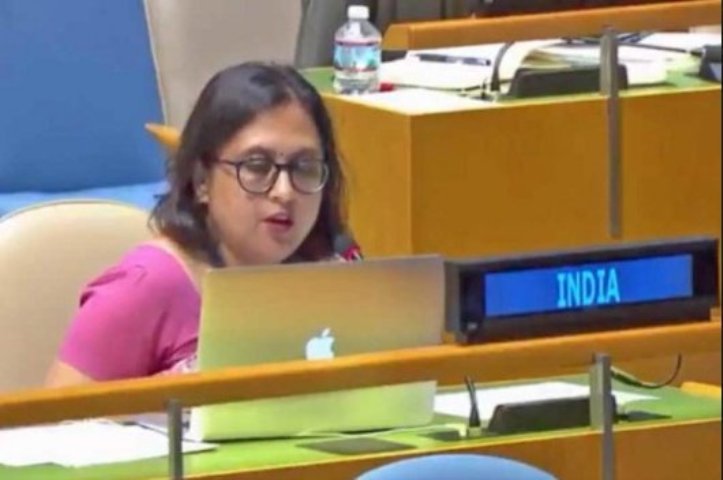UN approves India's proposal ensuring proscribed entities not granted Consultative Status

- Country:
- United States
The UN has approved India's proposal to ensure that applications by NGOs seeking consultative status with the world body's Economic and Social Council (ECOSOC) are not from individuals and entities proscribed by the UN Security Council. The move will guarantee that persons and entities banned by the UNSC are not associated with the world body.
Counselor in India's Permanent Mission to the UN Paulomi Tripathi welcomed the decision of the UN's NGO Committee to include additional screening questions for the NGOs seeking consultative status with the ECOSOC. The additional screening is related to the NGOs' possible associations with entities and individuals sanctioned by the UN Security Council.
"We are glad that India's proposal to corroborate the NGO applications with the sanctions list of the UN Security Council before granting consultative status has resulted in this important first step in strengthening the review process by the Committee," Tripathi said during an intervention at the regular session of the ECOSOC Committee on NGOs on Tuesday. Tripathi underscored that the aim is to ensure that NGOs affiliated with individuals and entities proscribed by the UN Security Council shall not enter into a Consultative Status with the ECOSOC.
She said the additional information received through the amended questionnaire will help in verifying the NGO applications with the sanctions list of the UN Security Council before granting consultative status. "This step addresses a gap in the method of exercising due diligence while granting consultative status. It also seeks to bring the work of the NGO Committee in alignment with the measures taken by the Security Council on behalf of all UN Member States," she said.
She cited two instances in July 2017 and in June 2019 when the Committee's decision to grant Consultative Status to two organizations had to be reversed by the ECOSOC, based on information received about their alleged terror links. In July 2017, the ECOSOC decided against granting consultative status to Foundation Alkarama, following objections by the United Arab Emirates over the group's alleged ties to terrorists.
India supported the decision by the UN council to deny granting consultative status to the Geneva-based human rights NGO that had been declared a terrorist organization by the UAE and whose founder had been sanctioned by the US and the UN. The ECOSOC had decided not to endorse the NGO Committee's May 2017 recommendation for special consultative status to Alkarama.
In June 2019, the NGO Committee's decision to grant Consultative Status to Palestinian Association for Human Rights – ‘Witness’ was also reversed after Israel said the organization did not disclose its ties with Hamas. India voted in favor of the decision introduced by Israel in ECOSOC that objected to granting consultative status to the Palestinian NGO.
Following the vote, a press release by Israel's Permanent Mission to the UN said that the Palestinian organization, registered in Lebanon under the name "Witness", ostensibly dealt with the rights of Palestinian refugees in Lebanon. However, Israel's security establishment revealed that “Witness belongs to the Hamas movement and acts on its behalf against Israel as part of a network of institutions and organizations the terrorist organization operates outside the Gaza Strip.”
Israel Prime Minister Benjamin Netanyahu signed an order declaring "Witness" a terrorist organization. Referring to the two cases, Tripathi said such situations called for further strengthening of scrutiny of NGO applications at the Committee itself before they are recommended for consultative status.
Emphasizing that non-governmental organizations with consultative status contribute to the work of the United Nations in a significant way, Tripathi described it as a partnership based on trust between the UN and the NGOs, as well as the NGOs and the communities whose voices they represent. "It is in this spirit of trust that the Committee seeks further information from the NGOs regarding their possible linkages with individuals and entities in UNSC Consolidated List.
"We believe that only through such collective commitment to combat terrorism, we can ensure that no individual or entity sanctioned by the UNSC can enter into a relationship of trust with the United Nations. The current measure also ensures that greater scrutiny does not pose any hindrance in the process of granting consultative status." Consultative status to an NGO is granted by the ECOSOC upon recommendation of the ECOSOC Committee on NGOs, which is composed of member states.
The Committee on NGOs reviews new applications for consultative status twice a year, in January ('regular session') and in May ('resumed session’). The Committee does not decide but only recommends. These recommendations, contained in one report for the January session and one report for the May session, are reviewed by ECOSOC in June and July respectively.
In most cases, ECOSOC decides to approve the recommendations made to it by the NGO Committee. In very rare cases, it does not.
(This story has not been edited by Devdiscourse staff and is auto-generated from a syndicated feed.)
ALSO READ
Danger of escalation on the Lebanon-Israel border is real, say UN peacekeepers
Israeli airstrikes pound Hamas terror sites
3 sons and three grandchildren of top Hamas leader are killed in Israeli airstrike in Gaza
Sons of Hamas leader Ismail Haniyeh killed in Israeli airstrike, Hamas media confirms
Three sons of Hamas leader Haniyeh killed in Israeli airstrike










